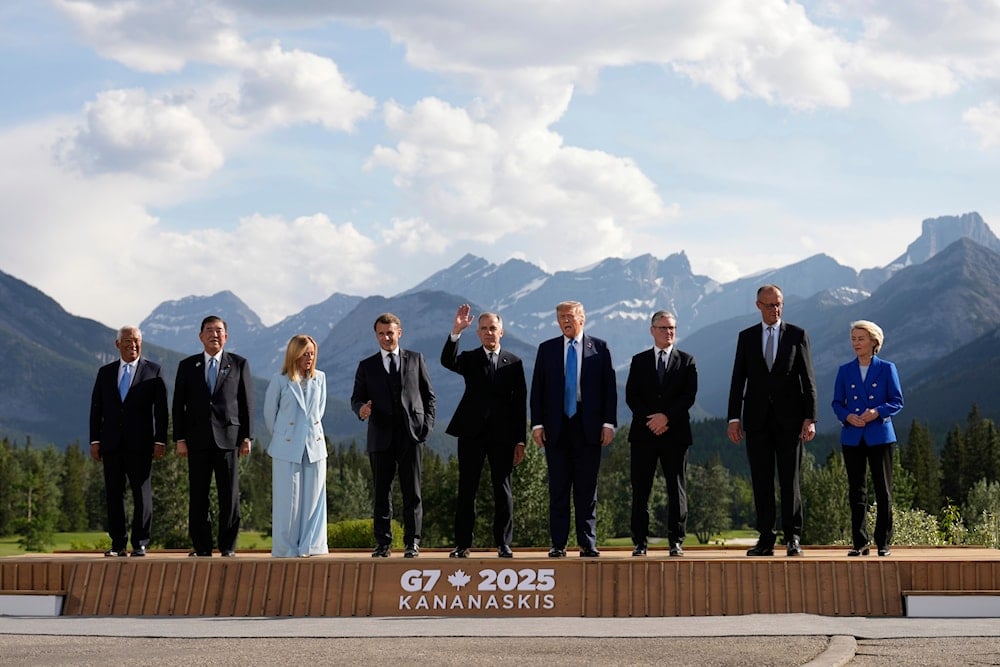G7 calls on Iran against uranium enrichment
The G7 foreign ministers call on Iran to stop its nuclear enrichment and resume cooperation with the IAEA, while urging both Iran and "Israel" to uphold the ceasefire.
-

G7 leaders pose for a group photo at the summit in Kananaskis, Canada, on June 16, 2025. (AP)
The G7 foreign ministers issued a joint statement urging both "Israel" and Iran to adhere to the ceasefire, while also calling on Tehran to avoid engaging in what they described as "unjustified enrichment activities."
"We reaffirm that the Islamic Republic of Iran can never have nuclear weapons, and urge Iran to refrain from reconstituting its unjustified enrichment activities," the statement published on Monday said.
The statement added: "We call for the resumption of negotiations, resulting in a comprehensive, verifiable and durable agreement that addresses Iran’s nuclear program. In order to have a sustainable and credible resolution, we call on Iran to urgently resume full cooperation with the International Atomic Energy Agency."
The ministers also urged Iran and "Israel" to avoid any actions that might escalate tensions or destabilize the region, while emphasizing the importance of upholding the ceasefire.
The G7's calls come as Iran recovers from a 12-day aggression launched by "Israel", under the guise of dismantling Iran's nuclear program.
Pezeshkian slams IAEA double standards
During a phone call with French President Emmanuel Macron on June 29, Iranian President Masoud Pezeshkian emphasized that Iran's decision to halt cooperation with the IAEA was driven by what he described as "false reports" from IAEA Director General Rafael Grossi regarding Iran’s nuclear program, as well as Grossi’s refusal to denounce the Israeli attacks targeting Iran’s nuclear facilities.
Pezeshkian condemned what he described as the international community’s double standards, arguing that while Iran’s peaceful nuclear program faces scrutiny, the Israeli occupation entity’s undeclared nuclear weapons program goes unchallenged.
The Iranian president stressed that all of Iran’s nuclear activities are conducted under IAEA oversight, despite what he described as ongoing attacks on the country’s nuclear facilities by the US and "Israel," while also pointing out that "Israel" remains outside the Treaty on the Non-Proliferation of Nuclear Weapons (NPT) and has repeatedly flouted international norms.
He further voiced apprehension about the IAEA's recent actions, arguing that they erode Iranian public confidence in the agency, while emphasizing that rebuilding this trust would necessitate the IAEA's strict adherence to its statutory rules and mandated responsibilities.
Pezeshkian raised doubts about whether Iran could receive credible guarantees for the security of its nuclear sites against potential future assaults, particularly given its continued engagement and collaboration with the IAEA.
Iran suspends IAEA cooperation
It is worth mentioning that last week, on June 27, Iranian Foreign Minister Abbas Araghchi announced that the Iranian Parliament had voted to suspend cooperation with the International Atomic Energy Agency (IAEA) until the safety and security of the country’s nuclear infrastructure can be guaranteed.
The decision followed days of mounting tension over the US and the Israeli regime's attacks on Iranian nuclear facilities, which Tehran said were politically facilitated by the IAEA’s leadership. Araghchi also directly blamed IAEA Director-General Rafael Grossi for contributing to what he called “a sordid state of affairs.”
In a statement published on X, Araghchi accused Grossi of playing a “regrettable role in obfuscating” the fact that the IAEA had closed all past issues with Iran's nuclear program a decade ago. Instead of upholding that record, Grossi, according to Araghchi, enabled the IAEA Board of Governors to adopt a “politically-motivated resolution” against Iran.

 4 Min Read
4 Min Read










